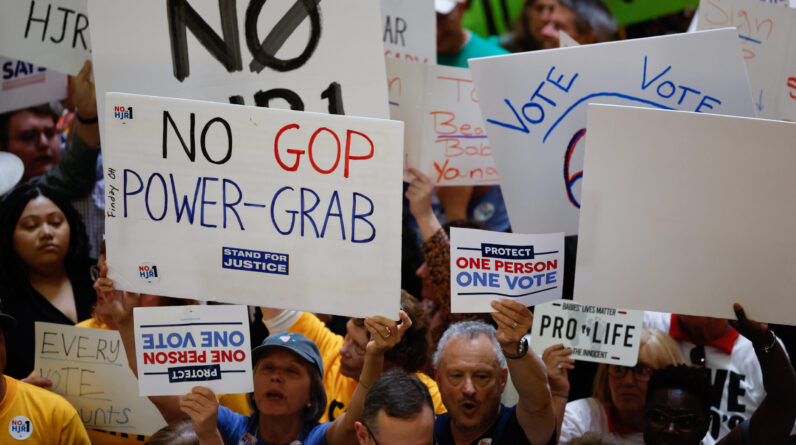
After the sweeping decision to reset the August special election in an attempt to thwart a possible abortion vote, leading constitutional law experts have ruled the resolution illegal.
State House and Senate lawmakers on Wednesday evening approved Senate Joint Resolution 2 to put a measure on a special election ballot in August to require 60 percent of Ohio voters to amend the constitution state, a move some lawmakers hope will make it less. voters likely to legalize abortion in November.
News 5 spoke to a host of legal experts with varying political leanings. They all came to the same conclusion that opponents would have a very strong legal case against the resolution.
Case Western Reserve University law professor Jonathan Entin and former Cleveland State University dean Steven Steinglass are the state’s leading experts on Ohio constitutional law, and both are nonpartisan.
“It is highly unlikely that the legislature will be able to set up an August election simply by passing this resolution,” Entin said.
To see why Entin thinks lawmakers are wrong, let’s go back a few months.
In December 2022, the General Assembly voted to ban August special elections, with one exception. This exception is if a political subdivision or school district is in a state of fiscal emergency.
What lawmakers are trying to do now is to overturn that ban with their resolution. Steinglass explains that this cannot be done.
“It’s in direct conflict with a fundamental principle of Ohio constitutional law,” Steinglass said.
In 1897, the Ohio Supreme Court held that the legislature could not amend statutes by passing joint resolutions.
Supporters of SJR 2 say they have case law, a more recent one, to offer.
“The court ruling was that you don’t necessarily have to have that spelled out in a bill,” said state Rep. Brian Stewart (R-Ashville). “One resolution is enough.”
The case Stewart refers to is from 1967. Here’s the one direct language:
“The General Assembly may authorize such a special election on a specified date by joint resolution without enacting a statute.”
However, Steinglass said the law the General Assembly passed in December makes that argument invalid, since Ohio already has an existing ban. The reason it worked in the 1960s is that the court said there was no “conflict with existing statute.”
“If the action . to the extent that it conflicted with this action.” explained the court.
Experts say the GOP has essentially tied its own hands.
Republicans disagree, saying this will be permanent.
“I’m not going to argue about the route we took if we got to the right destination,” Stewart added.
In an analysis of SJR 2, the nonpartisan state Legislative Service Commission wrote that “the General Assembly may need to enact separate legislation to allow for the special election.”
The GOP has insisted it has a strong legal case.
What’s next for naysayers?
“Opponents of this can simply try to defeat it at the polls in August,” Steinglass said. “Or they can try to get the court to strike down the proposed vote, which happened in 1897.”
A lawsuit won’t stop the state from preparing for an election, Entin said, so the Ohio Supreme Court will have to weigh in on whether it can take place.
“Elections cannot be presented until it is clear that the elections would, in fact, be lawful,” Entin added.
Advocates raise concerns about this logic.
The Ohio Supreme Court has shut down district maps (numerous times, with extensive explicit comment about no gerrymandering) for Ohio elections. Republican lawmakers moved forward anyway.
This article was originally published on News5Cleveland.com and is published in the Ohio Capital Journal under a content exchange agreement. Unlike other OCJ articles, it is not available for free republishing by other media outlets as it is owned by WEWS in Cleveland.
keep going WEWS state reporter Morgan Trau Twitter i Facebook.
GET THE MORNING HEADLINES IN YOUR INBOX
SUBSCRIBE
[ad_2]
Source link





